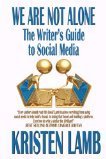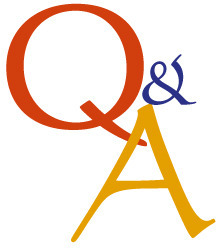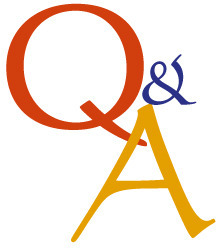Jacqui Murray's Blog, page 201
November 9, 2011
Book Review: We Are Not Alone
 We Are Not Alone: The Writer's Guide to Social Media
We Are Not Alone: The Writer's Guide to Social Media
by Kristen Lamb
My rating: 5 of 5 stars
View all my reviews
Kristen Lamb's wonderful social media how-to book, We are Not Alone: The Writer's Guide to Social Media (Who Dares Wins Publishing 2010), delivers on her promise. She provides a great nuts-and-bolts introduction to the basics of marketing your book online. She shares her knowledgeable insights in branding yourself, putting your name out there (something we innately fear), and joining the online conversation in an enthusiastic voice that can motivate you even though it's… just words. She then explains how to get your new 'brand' out there on the many facets of social media, including Facebook, Twitter My Space (think: Google Plus instead), and a WordPress blog. She also has a lively blog where she interacts with readers, answers questions and explains where times have changed and she no longer pushes the My Space sign-up (I suggested Google Plus as a replacement because I've found lots of useful info in my G stream).
I've spent considerable time learning how to market online. I don't have a lot of discretionary money to spend on hiring agents or specialists. Spreading the word must be through me and be pretty cheap. Since I have yet to publish a fiction book, most of my effort is directed at my non-fiction technology training textbooks for K-8. So, I sat down at my computer, Kristen's book in my lap, and compared her instructions to my current marketing plan. Here's what I found:
She convinced me of the importance of branding–putting my name or pen name on all of my writing so readers understood my voice. As a result, I added my name to this blog. I didn't add it to my tech blog because I think Ask a Tech Teacher (my blog name) is a brand of itself.
I purchased my name as a URL and set up a website (with the help of the guys at WriteClick who do a great job focusing on the unique needs of writers in blogging)
I pay attention now to my Twitter streams. I found out a lot of people were retweeting my material and mentioning me. I can't believe I never responded.
She explained that online marketing for writers isn't about pushing a book, but sharing expertise. That validates my inherent layback style. I'd much prefer to chat than sell.
She told me to create a collection of strategic content material–my best posts that showcase my writing, thought process and voice for potential readers. I've now done that. When I do guest posts, I can cull from this collection–update it, add/delete as necessary, knowing the basic content is strong
I reworked my bio to describe me in the context of my brand. Since I have multiple personae, this was more challenging than it sounded on the pages of her book, but I've done that. Now, I attach that quick bio to each post as a summary of my creds (you can see my writing bio at the end of this post).
I'm supposed to create a detailed profile of my reader demographics, but I have only a general one. Eventually, this suggestion will percolate through my brain enough to come up with a way to accomplish it, but right now, I'll settle for less.
The true test of a how-to book like We are Not Alone is whether it worked. Truth–I'm not sure. Don't get me wrong. I know she made the right suggestions. Every year, my sales increase. I'm doing as she suggested so I have no doubt that these types of actions are responsible for that increase, but I have difficulty knowing where to attribute the success. Here's what I mean:
Thanks to WordPress statistics, I can see where I'm getting my readers. In WordDreams, 80% come from Google or people who stumble on my blog. Only 20% are pull-throughs–from posts I've made, comments I've added to other people's articles, or my social media feeds. On the contrary, 80% of my Ask a Tech Teacher readers come directly from my effort–posts, comments, web presence, etc. Only 20% stumble only my content.
Again, thanks to my WordPress statistics, I can see who interacts with my blogs. 90% of my WordDreams readers don't interact, though they hang out and read a lot. On the contrary, 90% of my Ask a Tech Teacher readers click through on my links. Sometimes, I'll have 800 readers click through in a day compared to well under 100 on WordDreams . That's a big difference, considering both WordDreams and Ask a Tech Teacher have a similar readership
Overall, this book should be in every new and midlist writer's library. It'll either teach you what to do or reinforce what you're already doing right.
Jacqui Murray is the editor of a technology curriculum for K-fifth grade and creator of two technology training books for middle school. She is the author of Building a Midshipman, the story of her daughter's journey from high school to United States Naval Academy midshipman. She is webmaster for five blogs, an Amazon Vine Voice book reviewer, a columnist for Examiner.com, Editorial Review Board member for Journal for Computing Teachers, IMS tech expert, and a weekly contributor to Write Anything and Technology in Education. Currently, she's looking for an agent for a thriller she's finally finished. Any ideas? Contact Jacqui at her writing office or her tech lab, Ask a Tech Teacher.
Filed under: book reviews, marketing, social networks, writers resources Tagged: book sales, kristen lamb, marketing, social media








November 8, 2011
Tech Tip for Writers #26: My Mouse Doesn't Work
 As a working technology teacher, I get hundreds of questions from parents about their home computers, how to do stuff, how to solve problems. Each Tuesday, I'll share one of those with you. They're always brief and always focused. Enjoy!
As a working technology teacher, I get hundreds of questions from parents about their home computers, how to do stuff, how to solve problems. Each Tuesday, I'll share one of those with you. They're always brief and always focused. Enjoy!
Q: My mouse stopped working. Do I need to buy a new one?
A: Maybe, but try a few things first:
Check the plugs. Is it still plugged in?
Check the batteries (if it's a wireless)? Do you need to replace them?
Make sure your wireless hub (if it's wireless) is in proximity that the mouse and keyboard can find it
Reboot your computer. This is a universal cure for all stuff that goes awry on a computer. There are so many drivers and commands floating around in the operational sequence, they get lost somethings. A reboot might get the mouse driver back where the system can find it.
Before you buy a new mouse, plug a spare in–see if it works.
Questions you want answered? Leave a comment here and I'll answer it within the next thirty days.
To sign up for Tech Tips delivered to your email, click here.
Jacqui Murray is the editor of a technology curriculum for K-fifth grade and creator of two technology training books for middle school. She is the author of Building a Midshipman , the story of her daughter's journey from high school to United States Naval Academy midshipman. She is webmaster for five blogs, an Amazon Vine Voice book reviewer, a tech columnist for Examiner.com , Editorial Review Board member for Journal for Computing Teachers, IMS tech expert, and a weekly contributor to Write Anything . Currently, she's working on a techno-thriller that should be ready next summer. Contact Jacqui at her writing office or her tech lab, Ask a Tech Teacher.
Filed under: tech tips for writers, writers tips Tagged: mouse, tech tips, writers tips








November 7, 2011
Writers Tips #83: 17 Tips from Writing the Blockbuster Novel

Great tips for soon-to-be great writers
When you read your story, does it sound off, maybe you can't quite put your finger on it, but you know you've done something wrong? Sometimes–maybe even lots of times–there are simple fixes. These writer's tips will come at you once a week, giving you plenty of time to go through your story and make the adjustments.
When Albert Zuckerman wrote his acclaimed book, Writing the Blockbuster Novel (Writers House Press 1994), he made no apologies for directing this how-to-write book at those who want to pen the big story, the one that vaults a writer to the fore of his art, the script that makes movie makers drool. All novelists aspire to that (in the way all children aspire to be President), but few will achieve it. Nevertheless, the tips he shares serve every story well, even the niche novel that only appeals (though rabidly) to a cult of readers.
Here are the ones that caught my attention:
create a character readers will readily identify with
create a setting in a milieu people would like to visit rather than a poor working-class district of England
offer a big dramatic question that will engage the reader's attention from beginning to end
give the people in the story a past
have a distinctive voice. It can grow "out of your own special affinity for the English language, out of the rhythms, tones and nuances you hear and weave into your own mind of people's speech, out of your own highly personal and somewhat skewed vision of the world"
have an eye for detail. This "is more instinctive than acquired. But not for all details, only the most telling ones."
"The great storyteller has an acuity of perception as sharp as that of a visual artist and can make music in words. Not only in dialogue, but in characters' thoughts and emotions, in visual perceptions, sounds, smells, palpable sensations, visceral reactions."
"Create fictional characters deeply involved with each other… It's only about such characters that readers care. And for a novel to become popular, and to live on, we the readers must care."
"Energy, willpower and grit are also qualities … that cannot be taught
"The author who cannot set aside a completed five- or eight-hundred page draft and start all over from page one, throwing out scenes and entire chapters, altering and enriching relationships, characters and locales, intensifying conflicts and climaxes, is also unlikely to attain the high level of sustained drama contained in most best-selling novels."
"A crucial and unteachable … element in a leading novelist's toolbox is culture, widespread general knowledge, rich and varied life experience"
"In its essence… a novel is emotion."
"The first thing to note about a big novel is that what's at stake is high–for a character, a family, sometimes a whole nation."
"The life of at least one major character is usually in peril."
"In many major women's novels… the principal stake is not life or death but personal fulfillment."
"A second key characteristic of the mega-best seller is larger-than-life characters
"…the book's opine–the ongoing central conflict around which its major characters interact, the main issue that drives and unites its myriad scenes–couldn't be more basic and clear-cut."
Even if you aren't writing that 'high concept' novel, these are good guidelines.
Time for me to create my checklist (I love checklists) and review my draft with an eye for this list of details. See you in a few days.
Jacqui Murray is the editor of a technology curriculum for K-fifth grade and creator of two technology training books for middle school. She is the author of Building a Midshipman, the story of her daughter's journey from high school to United States Naval Academy midshipman. She is webmaster for five blogs, an Amazon Vine Voice book reviewer, a columnist for Examiner.com, Editorial Review Board member for Journal for Computing Teachers, IMS tech expert, and a weekly contributor to Write Anything and Technology in Education. Currently, she's working on a techno-thriller that should be ready this summer. Contact Jacqui at her writing office or her tech lab, Ask a Tech Teacher.
Filed under: Uncategorized, writers resources, writers tips Tagged: blockbuster novel, high concept, writers tips








November 4, 2011
How Your Characters Might Recognize an Emotion Part II
Emotion, as much as any other part of a story, must be shown, not told. How much more effective is it to say
He clenched is fists until his fingernails dug painfully into his palms
rather than
He was so angry, he saw red.
I've collected a list of actions characters display and participate in to communicate their emotions. Some are culled from other author's writings–how they effectively communicated the emotion (effective for me, anyway) and others from books on body language. You'll find some are in the main character's POV; some from that of one who is watching. They help me make sure my character's body language is in sync with what they're feeling.
Emotions A-F are in a prior post. Emotions G-Z are here:
Happy

Photo credit: MedSchoolIsHard Blog
eyes sparkle, with the skin a little wrinkled round and under them, and with the mouth a little drawn back at the corners
bring tears into the eyes
Helplessness
shrug shoulders
elbows turn inwards
extend hands outwards and open palms
Obstinacy
mouth firmly closed, lowering brow, slight frown
Sadness Seen in…
bowing postures of the body wall
in the cry face and lip-pout
in gazing-down
in a slumped (i.e., flexed-forward) posture of the shoulders
in the audible sigh.
drooping eyelids
flaccid muscles
hanging head
contracted chest
lowered lips, cheeks, and jaw ("all sink downwards from their own weight")
raised inner-ends of the eyebrows and remaining motionless and passive Anatomy
In acute sadness, muscles of the throat constrict, repeated swallowing occurs, the eyes close
Facial signs include frowning eyebrows mouth pouted or compressed
Shame

Photo credit: Addiction Treatment Strategies
a blush especially low down the body does the blush extend
Stress
Difficulty making decisions.
Angry outbursts.
Forgetfulness.
Low energy level.
Constant worrying.
Propensity for mistakes.
Thoughts about death or suicide.
Trouble getting along with others.
Withdrawing from others.
Hiding from responsibilities.
Carelessness
I find it difficult to concentrate because of distracting thoughts.
I worry about things that don't matter.
I feel jittery.
I get diarrhea.
I imagine terrifying scenes.
I cannot keep anxiety-provoking pictures and images out of my mind.
My stomach gets tense.
I pace up and down nervously.
I am bothered by unimportant thoughts running through my mind.
I become immobilized.
I feel I am losing out on things because I cannot make decisions fast enough.
I perspire.
I cannot stop thinking worrisome thoughts.
Become irritable when you have to wait in line or get caught in a traffic jam?
Eat, drink, or smoke in an attempt to relax and/or relieve tension?
Worry about your work or other deadlines at night and/or on weekends?
Wake up in the night thinking about all the things you must do the next day?
Feel impatient at the slowness with which many events take place?
Find yourself short of time to complete everything that needs to take place?
Become upset because things have not gone your way
Tend to lose your temper and get irritable?
Wake up in the night and have a hard time getting back to sleep?
Drive over the speed limit?
Interrupt people while they are talking or complete their sentences for them?
Forget about appointments and/or lose objects
signs of stress: My heart beats faster.
symptoms of stress such as tension, pain in the neck or shoulders, or headaches
Tension

Photo credit: Curbing Office Hostility
Frowning
Twitching
Eyelids Breathing rapid
Breathing irregular
Mouth tight
Swallowing
Be aware of nervous gestures: If someone brushes their hair back with their fingers, their thoughts conflict with yours. If someone is biting their lip, they are anticipating something.
Trust
The wider the gesture, the closer someone is to you, the warmer his opinions of you
Watch head position. tilted heads are trying to convince you of their honesty
Check their arms. The worst thing that you can do to people with crossed arms is to challenge them in one way or another. This annoys them. If someone rests their arms behind their neck, they are open to what is being discussed.
Lowered eyebrows and squinted eyes illustrate an attempt at understanding. It's usually skeptical.
Forced smiles only involve the muscles around the mouth
Can you add to this list? How do you convey emotion in your characters?
Jacqui Murray is the editor of a technology curriculum for K-fifth grade and creator of two technology training books for middle school. She is the author of Building a Midshipman, the story of her daughter's journey from high school to United States Naval Academy midshipman. She is webmaster for five blogs, an Amazon Vine Voice book reviewer, a columnist for Examiner.com, Editorial Review Board member for Journal for Computing Teachers, IMS tech expert, and a weekly contributor to Write Anything and Technology in Education. Currently, she's working on a techno-thriller that should be ready this summer. Contact Jacqui at her writing office or her tech lab, Ask a Tech Teacher.
Filed under: characters, descriptors, writers resources Tagged: body language, characterization, characters, emotions

November 2, 2011
Book Review: LA Mental
by Neil McMahon
My rating: 3 of 5 stars
Note to readers: This review is written as part of my Amazon Vine program
View all my reviews
Neil McMahon's latest novel, LA Mental (Harper 2011), blurs the line between thriller and sci-fi with a fast-paced storyline, an everyman sort of main character, and amoral bad guys who right up to the last sentence, appear to be unstoppable. When you've finished, the plot will haunt you, so realistic is its potential, and every once in a while a newspaper story will make you ask if fiction has become reality.
The story's hero, psychologist Dr. Tom Crandall, is dragged into a web of futuristic mind control in his effort to save his brother Nick from self-described 'worms' in his brain. When he tracks backward to see what happened to his offbeat-but-sane brother, he is infected with the same 'disease' and his family is threatened. As he digs deeper, he finds a genius 'scientist' who is experimenting with technology that can silently put any and everyone on the planet under his control. Crandall is not a detective, so his efforts are bumbling band-aids at best, reacting to events rather than controlling circumstances, but with a courage and tenacity readers can't fail to respect.
McMahon does a deft job of weaving background into each early scene so we get to know the characters–to like Tom, wonder about his brother Nick's morals and respect his mother's strength in the face of her failed progeny. McMahon falls into some novice writing mistakes (too many adverbs, telling action as narrative rather than in scene), that are tolerable in good books like this one. By mid-book, I could no longer ignore the sci-fi overtones. I found these also in Tess Gerritson's most recent book, so maybe it's a new trend in thrillers. Just as it seemed to be too much, he pulled smartly back to a reality I understood. The ending, though, I didn't find satisfying. Tom survives, though still at the mercy of the mind control menace, as does his family. He saves his girlfriend from death, though not an innocent bystander and he is unsuccessful in stopping the bad guys from infecting the world, as they do in the Epilogue. If you're looking for that super-human hero, flawed but valiant, who saves the world at the price of his own well-being, this is not that story.
I have a confession: The character of Tom Crandall leaves me mildly unsettled. He tells us early and too often how much he hates the wealth and privilege that nurtured his childhood. We see how his siblings came to depend upon the money umbilical cord, even as Tom rejects it–he won't work in the family businesses, he drives a beater, he walks away from his professional training as a psychiatrist in favor of teaching at a community college. I doubt that McMahon intended the political overtones that are impossible to miss in this era of anti-capitalist sentiment. He is not known for political novels. Still, those who favor that sentiment will enjoy its cameo appearance in this book.
Overall, if you like edgy fast-paced thrillers that force you to think about futuristic danger and keep you on the edge of your chair throughout, you'll want to read LA Mental.
Jacqui Murray is the editor of a technology curriculum for K-fifth grade and creator of two technology training books for middle school. She is the author of Building a Midshipman, the story of her daughter's journey from high school to United States Naval Academy midshipman. She is webmaster for five blogs, an Amazon Vine Voice book reviewer, a columnist for Examiner.com, Editorial Review Board member for Journal for Computing Teachers, IMS tech expert, and a weekly contributor to Write Anything and Technology in Education. Currently, she's working on a techno-thriller that should be ready this summer. Contact Jacqui at her writing office or her tech lab, Ask a Tech Teacher.
Filed under: book reviews, Scientific fiction, thrillers Tagged: mcmahon, sci-fi, thrillers [image error]

 [image error]
[image error]
 [image error]
[image error]
 [image error]
[image error]
November 1, 2011
Tech Tip for Writers #25: My Keyboard Doesn't Work
 As a working technology teacher, I get hundreds of questions from parents about their home computers, how to do stuff, how to solve problems. Each Tuesday, I'll share one of those with you. They're always brief and always focused. Enjoy!
As a working technology teacher, I get hundreds of questions from parents about their home computers, how to do stuff, how to solve problems. Each Tuesday, I'll share one of those with you. They're always brief and always focused. Enjoy!
You sit down to type, start in on that long project with an imminent deadline, and nothing happens. The cursor blinks… and blinks… and blinks… but goes nowhere.
What do you do?
Before you go buy a new keyboard, try a few things:
Is the keyboard's power light on? If it is, check your screen. Is there something that's preventing you from typing? Maybe a dialogue box that wants an answer? If the light isn't on, continue down this list
Check the plugs. Maybe the cord that connects the keyboard to the computer is loose or fell out.
Reboot. Sometimes the stuff in the computer's boot-up sequence that makes the keyboard work gets lost. Restart your computer so it can re-establish itself.
Do you eat at your keyboard? Does anyone? I say this next solution hesitantly: Bang on the keys. Sometimes they get food between them and get stuck. If that doesn't work, turn the keyboard over and see what falls out.
None of those work? Throw the darn thing out the window and buy a new one. They don't cost much any more.
Questions you want answered? Leave a comment here and I'll answer it within the next thirty days.
To sign up for Tech Tips delivered to your email, click here.
Jacqui Murray is the editor of a technology curriculum for K-fifth grade and creator of two technology training books for middle school. She is the author of Building a Midshipman, the story of her daughter's journey from high school to United States Naval Academy midshipman. She is webmaster for five blogs, an Amazon Vine Voice book reviewer, a columnist for Examiner.com, Editorial Review Board member for Journal for Computing Teachers, IMS tech expert, and a weekly contributor to Write Anything and Technology in Education. Currently, she's working on a techno-thriller that should be ready this summer. Contact Jacqui at her writing office or her tech lab, Ask a Tech Teacher.
Filed under: tech tips for writers Tagged: tech tips




 [image error]
[image error]


October 31, 2011
Writers Tips #82: 7 Tips on Time and Place from Donald Maass

Great tips for soon-to-be great writers
When you read your story, does it sound off, maybe you can't quite put your finger on it, but you know you've done something wrong? Sometimes–maybe even lots of times–there are simple fixes. These writer's tips will come at you once a week, giving you plenty of time to go through your story and make the adjustments.
In Donald Maass' excellent how-to-write treatise, Writing the Breakout Novel (Writers Digest 2001), each chapter ends with a checklist of items writers simply must accomplish if they plan to 'break out'. Here's one from his chapter on time and place:
Every story has a context, whether it is emphasized or not
Creating breakout time and place involves more than just describing setting
Using psychology of place means capturing how a place makes a point-of-view character feel
Convey a sense of the times
Portray historical forces and social trends through characters
Unexpected tragedy or grace adds a sense of destiny at work
Detail is the secret ingredient of breakout settings
Jacqui Murray is the editor of a technology curriculum for K-fifth grade and creator of two technology training books for middle school. She is the author of Building a Midshipman, the story of her daughter's journey from high school to United States Naval Academy midshipman. She is webmaster for five blogs, an Amazon Vine Voice book reviewer, a columnist for Examiner.com, Editorial Review Board member for Journal for Computing Teachers, IMS tech expert, and a weekly contributor to Write Anything and Technology in Education. Currently, she's working on a techno-thriller that should be ready this summer. Contact Jacqui at her writing office or her tech lab, Ask a Tech Teacher.
Filed under: characters, setting, writers tips Tagged: donald maass, writers tips



 [image error]
[image error]



October 26, 2011
Book Review: Killing Lincoln
 Killing Lincoln: The Assassination that Changed America Forever
Killing Lincoln: The Assassination that Changed America Forever
My rating: 5 of 5 stars
Note to Readers: This is part of my Amazon Vine Voice reviews. Coupling 'history' with 'Bill O'Reilly' unleashed a tidal wave of reader feedback. Check out my thoughts at the end of this review.
I recently had the pleasure of reading Bill O'Reilly and his co-author Martin Dugard's wonderful book "Killing Lincoln". This is a sensational book written as a contemporary thriller and takes full use of this technique to avoid being a dull regurgitation of dates,facts and figures. This book is a thoroughly researched and documented effort to accurately describe the shocking and horrifying murder of perhaps America's greatest President.
I must confess my knowledge of the Civil War era is extremely limited (embarrassingly so) and suspect I am not alone. Perhaps we can beseech Mr. O'Reilly to include the list of books that he found germane to the completion of this terrific work and share it with his loyal audio readers on his website (as he does in the print book). I would like to read much more about this critical juncture/time in American history.
The book starts with an overview of the Northern and Southern armies, their maneuver tactics and their respective strategies to prevail. There are wonderfully insightful looks at Lincoln near the battlefields his relationship with Grant and his overwhelming desire to hold and preserve the Union. The strength of the Northern armies eventually forces key Southern cities (Richmond) to succumb and simultaneously surround General Lee forcing him to the unthinkable, the surrender of his army.
Further, it tracks John Wilkes Booth and his co-conspirators as they initially start with plans to kidnap Lincoln, which would have been remarkably easy given the lax security surrounding him, to assassination. It ends with a touching description of Lincoln's final days after being shot and the capture and killing John Wilkes Booth. Bill's attempt to get into the minds and hearts of the key characters makes for a compelling read and a real page-turner. I highly recommend this book.
___________________________________________________________________________________________________________________________________________
As is my practice in my Amazon Vine activities, I didn't look at comments before writing this review. I read the book, drew my conclusions and posted my thoughts.
Then, I checked comments.
Wow! This excellent read got an average 'three star'–much lower than my 'five star'. I dove into the comments to find out why. A few too many readers started like this:
I like Bill O'Reilly very much.
As a faithful buyer of all O'Reilly's stuff…
I bought this book for my wife, who is a big O'Reilly fan.
…and many seemed to be reviewing the author Bill O'Reilly (not his co-author Martin Dugard) rather than the book. They picked at everything from his writing style to the historic facts to calling the writing 'boring… tedious, slow moving and ponderous.' O'Reilly employed the now-common non-fiction writing style–called creative non-fiction–of adding drama, climaxes and other elements of fiction to heighten the reading experience. I'm not a fan of that in history books, but I thought the story overcame the negatives of this approach.
My take-away from this experience is a real-life example of why we as authors can't take the reviews that appear on Amazon seriously. I'm not denigrating those who post them at all–they are readers taking the time to share their opinions–just reminding my fellow authors to not pull the razor out when you get a bad comment. Most of these are biased by the writer's experiences–not the objective analysis we authors might hope for.
Jacqui Murray is the editor of a technology curriculum for K-fifth grade and creator of two technology training books for middle school. She is the author of Building a Midshipman, the story of her daughter's journey from high school to United States Naval Academy midshipman. She is webmaster for five blogs, an Amazon Vine Voice book reviewer, a columnist for Examiner.com, Editorial Review Board member for Journal for Computing Teachers, IMS tech expert, and a weekly contributor to Write Anything and Technology in Education. Currently, she's working on a techno-thriller that should be ready this summer. Contact Jacqui at her writing office or her tech lab, Ask a Tech Teacher.
Filed under: book reviews, politics Tagged: book reviews, history, oreilly, vine voice


 [image error]
[image error]
 [image error]
[image error]


October 25, 2011
Tech Tip for Writers #24: How to Open A New Word Doc Without the Program
 As a working technology teacher, I get hundreds of questions from parents about their home computers, how to do stuff, how to solve problems. Each Tuesday, I'll share one of those with you. They're always brief and always focused. Enjoy!
As a working technology teacher, I get hundreds of questions from parents about their home computers, how to do stuff, how to solve problems. Each Tuesday, I'll share one of those with you. They're always brief and always focused. Enjoy!
Q: I can't find the Word icon that opens MS Word. What do I do?
A: Let's say you looked on your desktop and the Word icon that usually opens MS Word for you has disappeared. These things happen and always at the worst time. You might have pinned it to the start menu (see Tech Tip #53: How to Pin Any Program to the Start Menu), but what if you didn't?
No problem. All you have to do is right click on the desktop and pick New Word Doc. That's what it does–opens a new Word doc for you without going through opening the program first.
Questions you want answered? Leave a comment here and I'll answer it within the next thirty days.
To sign up for Tech Tips delivered to your email, click here.
Jacqui Murray is the editor of a technology curriculum for K-fifth grade and creator of two technology training books for middle school. She is the author of Building a Midshipman, the story of her daughter's journey from high school to United States Naval Academy midshipman. She is webmaster for five blogs, an Amazon Vine Voice book reviewer, a columnist for Examiner.com, Editorial Review Board member for Journal for Computing Teachers, IMS tech expert, and a weekly contributor to Write Anything and Technology in Education. Currently, she's working on a techno-thriller that should be ready this summer. Contact Jacqui at her writing office or her tech lab, Ask a Tech Teacher.
Filed under: tech tips for writers, writers tips Tagged: tech tips, Word, writers tips
 [image error]
[image error]
[image error]
[image error]
[image error]
[image error]
[image error]
[image error]
 [image error]
[image error]

October 24, 2011
Writers Tips #83: 29 Blunders from William Noble

Great tips for soon-to-be great writers
When you read your story, does it sound off, maybe you can't quite put your finger on it, but you know you've done something wrong? Sometimes–maybe even lots of times–there are simple fixes. These writer's tips will come at you once a week, giving you plenty of time to go through your story and make the adjustments.
In William Noble's pithy book on writing mistakes, Noble's Book of Writing Blunders, he lists 29 mistakes you never ever–I mean ever–want to make as a writer. If you wonder about any of these, buy his book and read the relevant chapter.
Here they are:
Don't write for your eighth grade teacher
Don't complicate the obvious
Don't be a slave to a grammar guru
Don't let that point of view waver
Don't freeze and formalize language
Don't use journalese or slangify words and phrases
Don't overuse the thesaurus
Don't underuse the dictionary
Don't duck the punch in punctuation
Don't wallow in a sentence straightjacket
Don't write the perfect paragraph
Don't get trick and jazzy with style
Don't add adverbs and adjectives to prettify your prose
Don't sprinkle the poet's urge over the narrator's product
Don't let rhythm and sound turn sour
Don't dabble with smoky words
Don't expect the maid to clean up your mess
Don't hug fad words without your fingers crossed
Don't get cute with spellings and dialogue
Don't wave away cliches and botched metaphors
Don't passify your very voice
Don't hide parallelisms in the prose
Don't ignore effective italics
Don't repeat without relevance
Don't assume author absolutism
Don't wrap characters in the same grammar blanket
Don't neglect grammar when mood and atmosphere change
Don't underestimate the richness of the English language
Don't be afraid to make your own rules
Jacqui Murray is the editor of a technology curriculum for K-fifth grade and creator of two technology training books for middle school. She is the author of Building a Midshipman, the story of her daughter's journey from high school to United States Naval Academy midshipman. She is webmaster for five blogs, an Amazon Vine Voice book reviewer, a columnist for Examiner.com, Editorial Review Board member for Journal for Computing Teachers, IMS tech expert, and a weekly contributor to Write Anything and Technology in Education. Currently, she's working on a techno-thriller that should be ready this summer. Contact Jacqui at her writing office or her tech lab, Ask a Tech Teacher.
Filed under: writers resources, writers tips Tagged: writers tips



 [image error]
[image error]
 [image error]
[image error]






